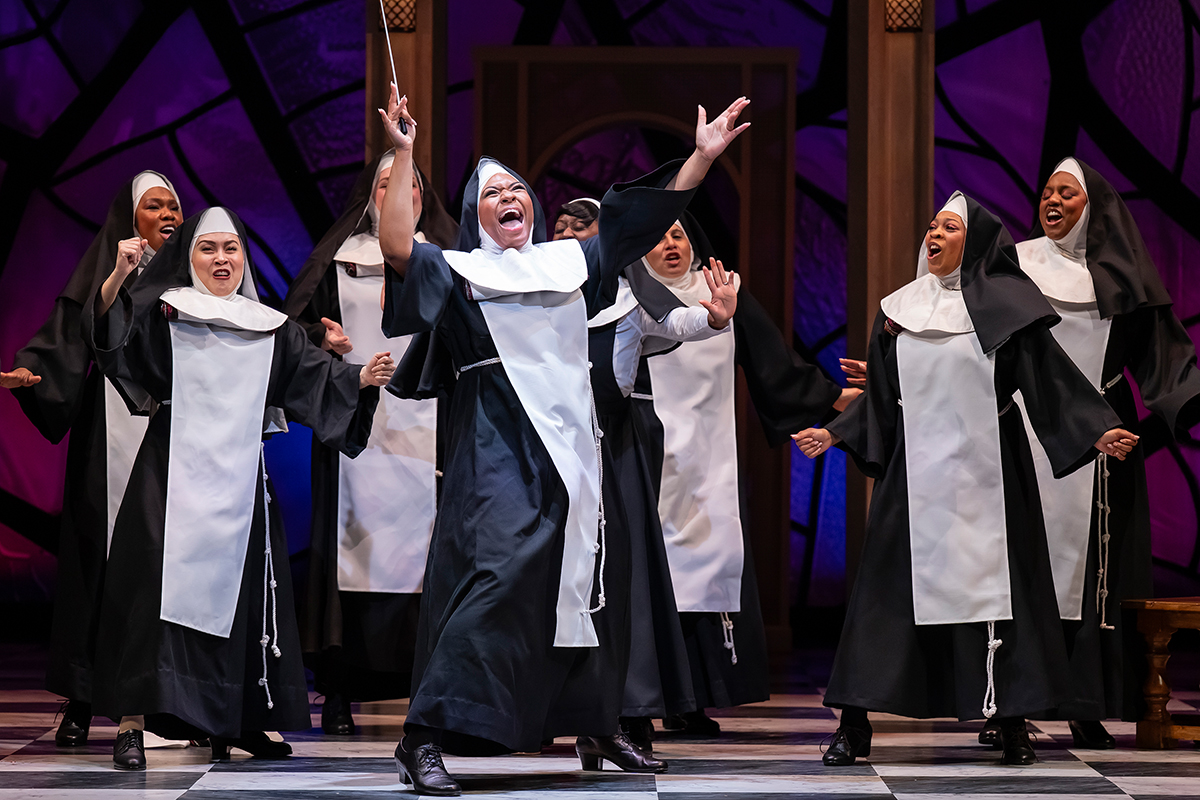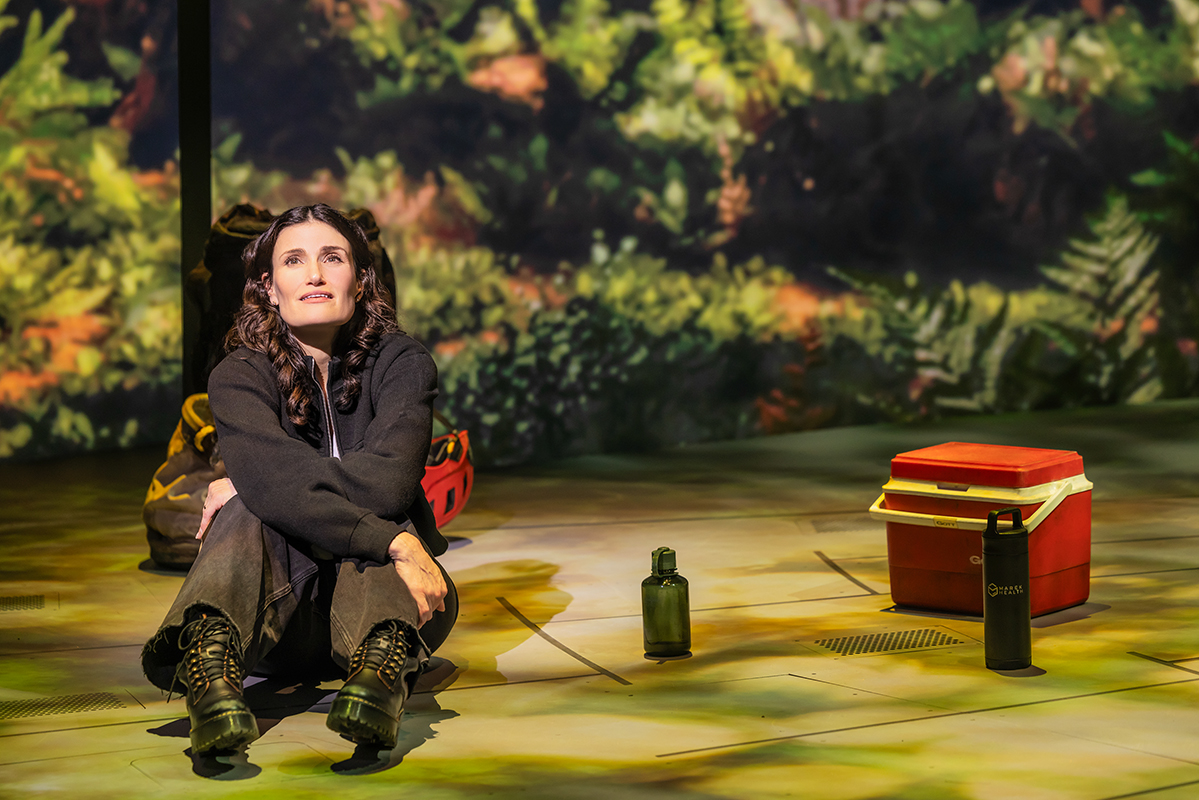‘Shout Sister Shout’ Review: Raising the Roof
As rock and roll pioneer Sister Rosetta Tharpe in Shout Sister Shout, Carrie Compere takes Ford's Theatre to church.

The marvelous leads of Shout Sister Shout! (★★★★☆) indeed sing and dance their souls to the rafters, and, under the keen direction of Kenneth L. Roberson, they also lend delicate attention to those moments when shouts are stilled into poignant silence.
Currently at Ford’s Theatre, Cheryl L. West’s musical play — a deftly constructed chronicle of trailblazing gospel, blues, and rock ‘n’ roll singer-musician Sister Rosetta Tharpe — is based on the biography Shout, Sister, Shout! by Gayle F. Wald. The show calls for powerhouse vocals from Carrie Compere in the title role.
D.C. audiences who witnessed Compere’s galvanizing turn as Sofia in the 2018 Broadway touring production of The Color Purple at the Kennedy Center should be delighted to see her return and deliver electrifying takes on Tharpe’s signature tunes.

Rocking Tharpe’s rendition of “Up Above My Head,” backed by a dancing choir, or swinging through “I Want a Tall Skinny Poppa” with the artist’s trademark guitar slung over her shoulder, Compere holds the stage assuredly, though not stingily. Often directly addressing the audience, her Rosetta brandishes the winning confidence that helped propel this guitar-plucking gospel girl from Cotton Plant, Arkansas to international fame and fortune in the 1940s.
Yet, Compere finds equally compelling notes of vulnerability and doubt, rendered well in non-verbal beats like the soft, sensual embrace that introduces Rosetta’s romantic connection to singer-pianist Marie Knight, portrayed with tenderness by Felicia Boswell.
The pair’s unexpected partnership, as a performing duo and as lovers, drives much of the second act.
Following the real-life trajectory of their affair, the Rosetta-Marie plot veers towards a stereotypical treatment of the Tragic Homosexual. Still, Compere and Boswell create a genuine, moving rapport that should inspire interesting post-theater conversations among the student field trips and tour groups that commonly attend Ford’s shows.

However, it’s Rosetta’s relationship with another woman, her mother Katie Bell, a singer and evangelist for the Church of God in Christ, that dominated her life, and is at the heart of this story. Carol Dennis embodies the woman and her gospel sound with such fervor and tough-loving spirit, church folks might swear they’ve met this Katie, or a woman very much like her.
Steadfast, unapologetic, and independent, she’s still deeply concerned about keeping up appearances, especially when the Church people start talking about her daughter’s supposedly sinful ways. Like Compere, Dennis is reprising the role she originated in the play’s 2019 premiere production at Seattle Rep, and the two match up so authentically, in song and in their constant mother-daughter push-pull of comfort and conflict.
Brought up singing gospel, but drawn to the blues and rockabilly, Rosetta throughout her life and career sought but couldn’t seem to find her place in the Church, nor in the secular world. West’s script charts that disconnection down myriad paths, including the depiction of Rosetta’s humorously hasty wedding to the Reverend Tharpe (Sinclair Mitchell) and eventual decision to leave him.
In that situation, too, mother Katie lends comfort and support to her still quite young daughter, while at the same time offering conflicting advice about what needs to happen next.
Roberson’s well-considered direction doesn’t quite resolve the contradiction in that moment, but generally steers the drama, and musical transitions, swimmingly well through complicated turns. Scenic designer Tim Mackabee does his part with a centerstage turntable that smoothly moves set pieces in and out of a bank of tall louvered doors topped by a balcony, topped by another balcony perch for the orchestra.
The wood construction suggests the inside of a voluminous house of God — the giant cross that lowers into place for the Reverend’s sermon might have overstated the point. The play does not overstate, but is justifiably emphatic about, Sister Rosetta Tharpe’s musical influence on early rockers Elvis Presley, Chuck Berry, Johnny Cash, and Little Richard, whom she discovered.
In the show, Rosetta rubs elbows with Dizzy Gillespie (Keenan McCarter), Mahalia Jackson (Kelli Blackwell, a delight in her brief appearance), and a typically jazzed Cab Calloway (Joseph Anthony Byrd, who kills it), but she always is the star we came to see, the woman they called Showbiz, the Godmother of Rock and Roll, and the Swinging Gospel Queen. Long live the queen.
Shout Sister Shout! runs through May 13 at Ford’s Theatre, 511 Tenth St. NW. Tickets are $36 to $90. Call 888-616-0270, or visit www.fords.org.
Support Metro Weekly’s Journalism
These are challenging times for news organizations. And yet it’s crucial we stay active and provide vital resources and information to both our local readers and the world. So won’t you please take a moment and consider supporting Metro Weekly with a membership? For as little as $5 a month, you can help ensure Metro Weekly magazine and MetroWeekly.com remain free, viable resources as we provide the best, most diverse, culturally-resonant LGBTQ coverage in both the D.C. region and around the world. Memberships come with exclusive perks and discounts, your own personal digital delivery of each week’s magazine (and an archive), access to our Member's Lounge when it launches this fall, and exclusive members-only items like Metro Weekly Membership Mugs and Tote Bags! Check out all our membership levels here and please join us today!

























You must be logged in to post a comment.